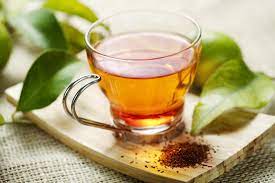Bloating and gas are two common digestive problems that can cause discomfort and embarrassment. While there are several over-the-counter medications to alleviate these symptoms, many people prefer natural remedies, such as herbal teas.
Herbal teas have been used for centuries to help with digestion and other health issues. In this article, we will explore five herbal teas that you can consume to get relief from bloating and gas. These teas are not only effective but also easy to make at home with simple ingredients readily available in your kitchen or local grocery stores. So, let’s dive into the world of herbal tea and discover natural solutions for a healthy gut!
Why herbal teas are good for bloating
Herbal teas have been widely used for centuries to treat various ailments, including digestive issues such as bloating and gas. Certain herbs have been shown to possess anti-inflammatory and carminative properties that can help alleviate the symptoms of bloating. One of the most popular herbal teas for bloating is ginger tea, which contains compounds that stimulate digestion and reduce inflammation in the gut. Ginger tea also helps relax the muscles in your digestive tract, allowing food to move more easily through your system.
Peppermint tea is another popular choice for those suffering from bloating. Peppermint contains menthol, a compound that has antispasmodic properties that can help relax the muscles in your intestines, reducing cramping and bloating. Additionally, peppermint has been shown to have soothing effects on the gastrointestinal tract and may reduce inflammation in some individuals.
Fennel tea is another herbal remedy commonly used for digestive issues like bloating. Fennel seeds contain volatile oils with compounds like anethole that can relieve spasms in the gastrointestinal tract while also reducing inflammation. Drinking fennel tea after meals may help prevent gas buildup by promoting digestion and improving nutrient absorption in your body. Overall, incorporating these herbal teas into your diet may provide a safe and natural way to find relief from uncomfortable bloating symptoms without relying on medication or harsh treatments.
Also Read: wellhealthorganic.com:if-you-are-troubled-by-snoring-then-know-home-remedies-to-deal-with-snoring
Peppermint tea:
Peppermint has antispasmodic properties that can help relax the muscles in the digestive tract and reduce bloating and gas. Steep a few fresh or dried peppermint leaves in hot water for 5-10 minutes and enjoy.
Peppermint tea is a popular choice for many people who suffer from bloating and gas. Peppermint contains menthol, which is known to have a relaxing effect on the muscles in the gastrointestinal tract, helping to reduce gas and bloating. The natural compounds found in peppermint also help to improve digestion, reducing the likelihood of stomach discomfort.
Peppermint tea can be especially beneficial after meals as it helps to stimulate bile flow, aiding in the breakdown and absorption of fats. Additionally, drinking peppermint tea can reduce inflammation in the gut caused by inflammatory bowel diseases such as Crohn’s disease or ulcerative colitis. This makes it an excellent choice for individuals experiencing chronic digestive issues.
Overall, peppermint tea is an excellent herbal remedy for those who experience regular bloating and gas due to poor digestion. Not only does it taste great but it also provides numerous health benefits that make it an ideal choice for anyone looking for a natural solution to their digestive problems.
Ginger tea:
Ginger is known for its anti-inflammatory and digestive properties, making it a popular choice for bloating and gas relief. You can grate fresh ginger and steep it in hot water, or use ginger tea bags.
Ginger tea is a go-to remedy for bloating and gas. It has been used for centuries to aid digestion and alleviate discomfort caused by digestive issues. Ginger contains gingerols and shogaols, which have anti-inflammatory properties that help soothe the digestive system. It also works as a natural muscle relaxant, calming the muscles in the intestines and reducing cramping.
To make ginger tea, simply slice fresh ginger root (about 1-2 inches) and steep it in boiling water for 5-10 minutes. You can add honey or lemon juice for added flavor and benefits. Drinking ginger tea before meals can help stimulate digestion, prevent bloating, and reduce gas.
In addition to its digestive benefits, ginger tea has also been shown to have anti-nausea properties and may be helpful in relieving menstrual cramps. Overall, incorporating ginger tea into your daily routine can provide numerous health benefits while also providing a soothing and comforting warm drink option.
Chamomile tea:
Chamomile has a calming effect on the body and may help reduce inflammation in the digestive system, which can contribute to bloating and gas. Steep chamomile flowers in hot water for 5-10 minutes.
Chamomile tea is an excellent option for those looking to get relief from bloating and gas. It has anti-inflammatory properties that can help soothe the digestive system and reduce discomfort caused by indigestion. Additionally, chamomile tea also contains muscle-relaxing properties that can help ease cramps in the stomach and intestines.
Moreover, chamomile tea is known for its calming effects on the body. Stress and anxiety are often linked to digestive issues, but drinking a cup of chamomile tea before bed can help relax your mind and body, leading to better sleep quality. This will ultimately result in reduced stress levels and improved digestion.
Lastly, chamomile tea is easy to make at home and can be consumed either hot or cold depending on your preference. You can add a slice of lemon or honey for extra flavor if desired. Overall, chamomile tea serves as an effective natural remedy for anyone experiencing bloating or gas discomfort.
Fennel tea:
Fennel seeds have carminative properties, which means they can help reduce gas and bloating. Crush a teaspoon of fennel seeds and steep them in hot water for 5-10 minutes.
Fennel tea is an excellent drink to consume when you’re feeling bloated or gassy. It contains natural compounds that have been shown to relax the muscles in the digestive tract, helping to ease discomfort and relieve constipation. Fennel tea is also thought to promote healthy digestion by stimulating the production of gastric enzymes, which can help break down food more efficiently.
In addition to its digestive benefits, fennel tea may also have other health benefits. Some studies suggest that it may be effective in reducing inflammation and fighting off harmful bacteria in the body. It’s also a good source of antioxidants, which can help protect cells from damage caused by free radicals.
Overall, if you’re looking for a natural way to soothe your stomach and improve your overall health, consider adding fennel tea to your daily routine. Whether you enjoy it hot or cold, this flavorful herbal infusion is sure to provide some much-needed relief from bloating and gas.
Also Read: wellhealthorganic.com/know-the-causes-of-white-hair-and-easy-ways-to-prevent-it-naturally
Lemon balm tea:
Lemon balm has been traditionally used to soothe digestive discomfort, including bloating and gas. Steep fresh or dried lemon balm leaves in hot water for 5-10 minutes.
Lemon balm tea is a refreshing herbal tea that has been used for centuries to help alleviate digestive issues such as bloating and gas. The leaves of the lemon balm plant contain natural essential oils that have antispasmodic properties, which means they can relax the muscles in the digestive tract and ease discomfort caused by gas and bloating. Drinking a cup of lemon balm tea after meals can help improve digestion and reduce bloating.
Aside from its digestive benefits, lemon balm tea also has calming effects on the body. It contains compounds that promote relaxation, making it an excellent beverage to enjoy when you’re feeling stressed or anxious. Sipping on a cup of warm lemon balm tea before bed can help you unwind and get a better night’s sleep.
To prepare lemon balm tea, simply steep 1-2 teaspoons of dried lemon balm leaves in hot water for 5-10 minutes. You can sweeten your tea with honey if desired, or add other herbs like chamomile or peppermint for added flavor and health benefits. Overall, incorporating lemon balm tea into your daily routine can be an easy way to improve your digestion and overall well-being.
Conclusion
In conclusion, bloating and gas can be quite uncomfortable and sometimes even painful. However, with the right herbal teas in your arsenal, you don’t have to suffer in silence. All five of the teas discussed in this article – peppermint tea, chamomile tea, ginger tea, fennel tea and dandelion root tea – have been shown to possess properties that can help alleviate bloating and gas.
It is important to note that while these herbal teas are generally considered safe for consumption, it is still advisable to consult with a healthcare provider before incorporating them into your diet. Additionally, if symptoms persist or worsen after consuming any of these teas or other home remedies for bloating and gas relief, seek medical attention immediately.
Overall, adding one or two cups of any of these herbal teas to your daily routine might just be what you need to enjoy relief from bloating and gas naturally without having to resort to over-the-counter medications or prescription drugs.
FAQ
Q: Can these herbal teas cause any side effects?
A: In general, these herbal teas are safe to consume in moderate amounts. However, some people may experience allergic reactions or digestive issues such as heartburn or nausea. It’s always best to start with a small amount and observe how your body reacts.
Q: Can pregnant women consume these herbal teas?
A: It’s always best to consult with a healthcare professional before consuming any herbal tea during pregnancy, as some herbs may not be safe for pregnant women.
Q: Can these herbal teas replace the medication for bloating and gas?
A: These herbal teas can be used as a complementary treatment to relieve bloating and gas, but they should not be used as a replacement for medication prescribed by a healthcare professional.
Q: How often should I drink these herbal teas?
A: You can consume these herbal teas as often as you like, but it’s recommended to limit your intake to a moderate amount to avoid potential side effects. Drinking 1-3 cups per day is generally considered safe for most people.
Q: Where can I purchase these herbal teas?
A: You can purchase these herbal teas at most health food stores, online retailers, and some grocery stores. Make sure to buy high-quality, organic teas to ensure their potency and purity.








